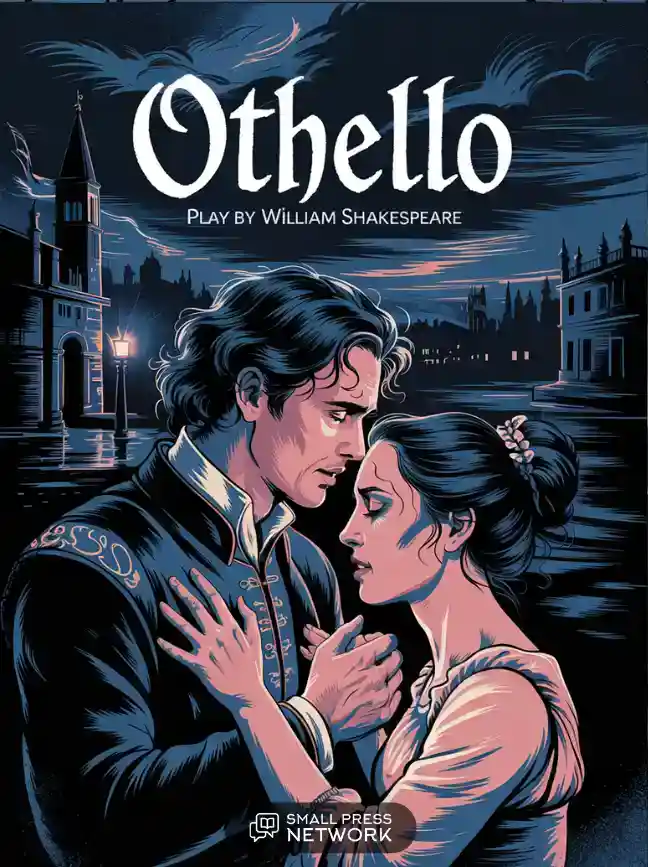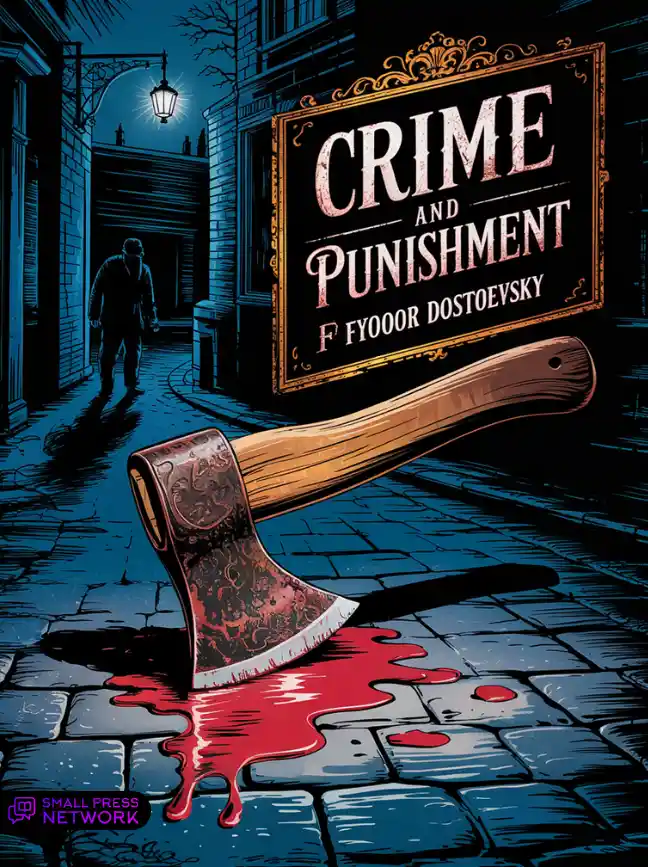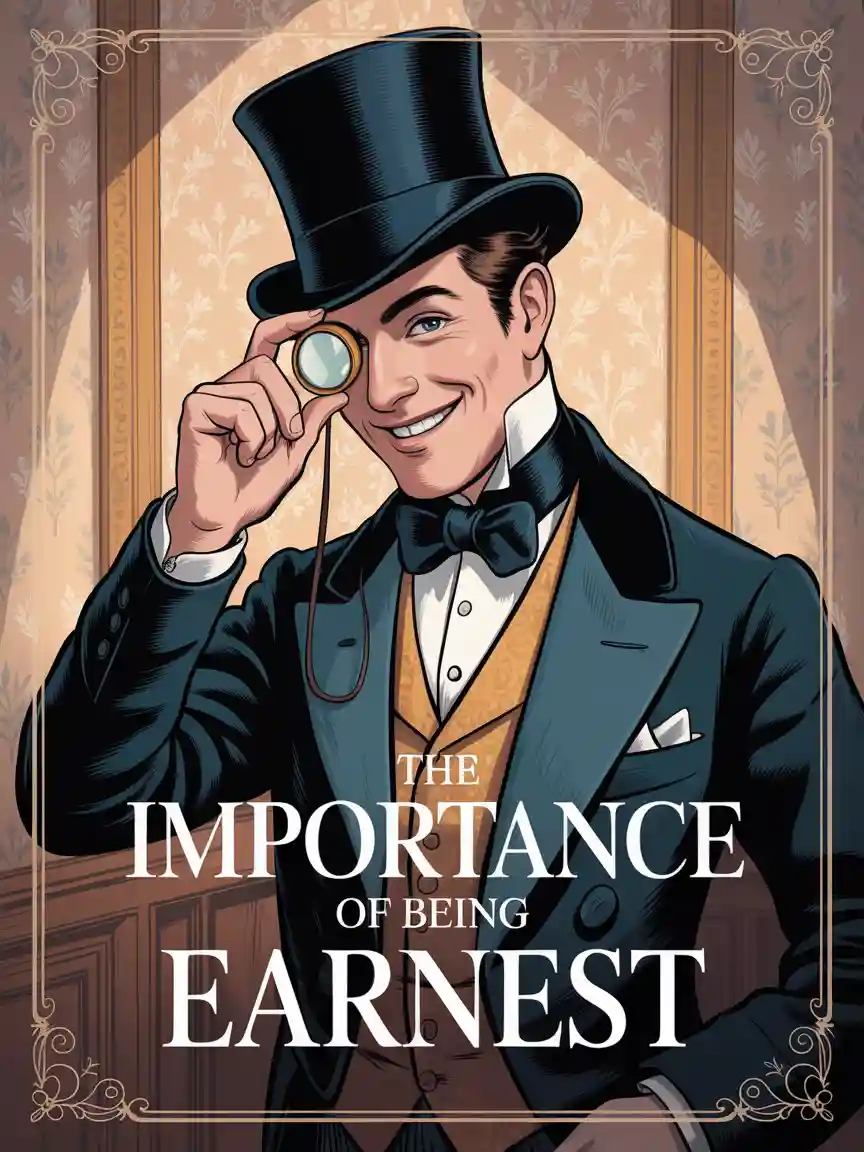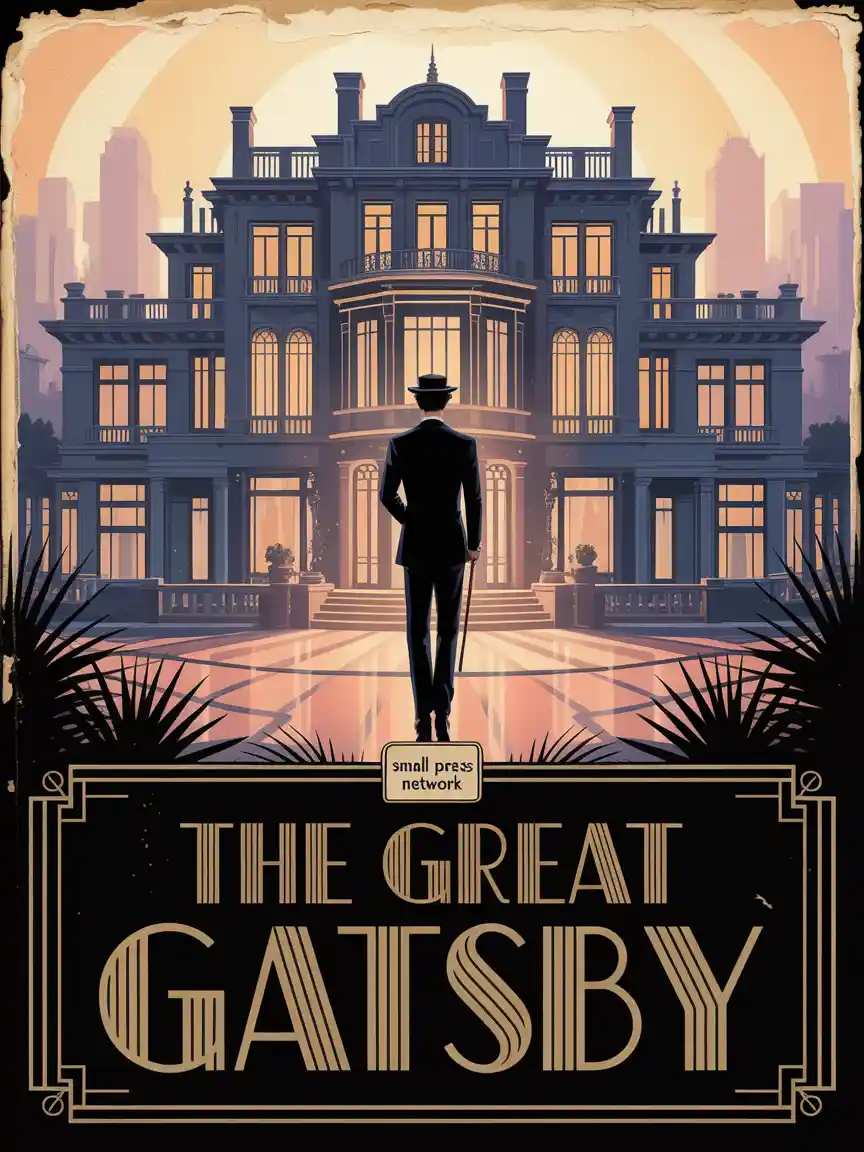(Othello, Lodovico, Desdemona, Aemilia, and retinue.)
Lodovico.
I beg you, sir, do not trouble yourself any further.
Othello.
Oh, I beg your pardon; the exercise will do me good.
Lodovico.
Madam, good night; I thank you, Your Grace, most humbly.
Desdemona.
You will always be welcome, my lord.
Othello.
Will you go, my lord?—Oh, Desdemona!—
Desdemona.
My husband—
Othello. Go to bed at once; I will soon return; send your servants away; do as I bid you.
Desdemona.
I will, my husband.
(Lodovico and Othello leave.)
Aemilia.
How are things now? He looks friendlier than he did this evening.
Desdemona.
He says he’ll be back at once, and has commanded me
to go to bed and send you away.
Aemilia.
Send me away?
Desdemona.
That was his command; so, my good Aemilia, give me my nightclothes
, and good night. We must not trouble him.
Aemilia.
I wish you’d never seen him!
Desdemona. I would not; my love is so well pleased with him that even his surly witnessing, his scolding and anger, has a kind of grace in my eyes. I pray you, take off my headdress—
Aemilia.
I have placed the sheets you told me to use on your bed.
Desdemona. It is all one: Good heavens! What foolish creatures we are! If I die before you, I pray you, make me my shroud of one of these cloths.
Aemilia.
Come, come; as you speak!
Desdemona. My mother had a chambermaid named Barbara; the poor thing was in love with someone who would not love her back, and at last she grew mad. She had a song that always ended with (willow). It was an old song, but it suited her circumstances, and she sang it to the last moment of her life. I cannot get that song out of my mind all night long; it takes all I have to keep from hanging my head on one side and singing it like poor Barbara. I pray you, do so.
Aemilia.
Should I go and get your sleeping skirt?
Desdemona.
No, stake me here; this Lodovico is a very kind
man.
Aemilia.
A very handsome man.
Desdemona.
He speaks well.
Aemilia.
I know a lady in Venice who
would have made a pilgrimage to the Promised Land for a squeeze of his lower lip.
Desdemona (sings)
The poor thing, she sat and sang, by a tree she sat,
Sing all, green willow;
Her hand laid on her breast, her head on her knee,
Sings willow, willow, willow;
The brook that murmurs beside her, joining in her sighs,
Sings willow, willow, willow;
And the hot flood of her tears softened the pebbles;
Sings willow, willow, willow;
Willow, willow, willow, etc. I pray thee, make haste, he will
return every moment. Sing all, a green willow-twig,
that must be my wreath.
* * * O! do not reprove his hard heart, my heart
forgives him gladly;
No, that does not follow yet—Hark, what is knocking so?
Aemilia.
It’s just the wind.
Desdemona (sings)
I called my lover false; what did he say then?
Sings Willow, Willow, Willow;
I play with other women, you with other men. So go
now, good night; my eyes burn; does that mean weeping?
Aemilia.
Let’s hope not.
Desdemona. I have heard it said: O these men, these men! Tell me, Aemilia, do you believe in your conscience that there are women who deceive their husbands in such a gross way?
Aemilia.
There are such people, there’s no question about that.
Desdemona.
Would you do such a thing for the world?
Aemilia.
What, wouldn’t you do it?
Desdemona:
No, by this heavenly light!
Aemilia. Neither can I, in this heavenly light; it could be done just as well in the dark.
Desdemona.
Would you do such a deed for the whole world?
Aemilia. The whole world is a pretty, respectable thing, though; it would be a fine price for so small a crime.
Desdemona.
By my faith, I think you would not.
Aemilia. And by my word, I think I would; with the reservation that it should be the first and last time. Truly, I wouldn’t do such a thing for a finger ring, nor a few yards of chambercloth, nor a new petticoat, or a cap, or anything so poor; but for the whole world! What woman wouldn’t make her husband a cuckold, so that he might be master of the whole world? I would even risk purgatory for that.
Desdemona:
I would die if I
did such an evil deed for the whole world.
Aemilia.
Why, injustice is only injustice in the world; and since you
received the world for your trouble, it would be injustice in your world,
and you could soon make it right.
Desdemona.
I cannot believe such a woman exists.
Aemilia. Oh yes, a dozen, and enough to populate the world they played for. But I think the fault lies with men when their wives fall; suppose they forget their duty to us and squander on others what is ours; or they burst into a petulant jealousy and subject us to slavish oppression; or they beat us, or they rob us of our fortunes; truly, we too have gall, and gentle as we are, we still gladly take revenge when we are offended. Our gentlemen should know that their wives are as sensitive as they are; they see and smell, and have a taste for sweet and sour as well as their men. What do they do when they exchange us for others? Is it fun? I will believe it: is it out of passion? I will believe it: Is it a human weakness? It may well be. And don’t we also have passions? Don’t we also love pastimes? Are we not as fragile as they? So let them treat us well; or let them know that when we sin, they have been our teachers.
Desdemona. Good night, good night; heaven grant me grace, instead of chasing evil with evil, to make evil right!
(They leave.)
Fifth act.
Scene One.
(A street in front of the palace.)
(Enter Iago and Rodrigo.)
Iago. Here, stand behind these barrels. He will come presently. Take your drawn sword in your hand, and then go for it! Be cheerful, be cheerful, be undaunted: I will be at your elbow. It will make our fortune, or we are lost. Think of this, and resolve like a man.
Rodrigo.
Just keep close at hand, I might miss him.
Iago. I will stand here; it could not be nearer. Take courage, and draw your sword.
Rodrigo (moving to one side) I undertake this deed reluctantly, but he has presented me with reasons against which there is no objection; in the end, it is nothing but one man less—Out, my sword; he shall die.
Iago (to himself) I have rubbed this poor fellow until he has become sensitive; he is beginning to burn out. Now, whether he murders Cassio, or Cassio him, or one murders the other, I shall always find my account in it. Well, but if Rodrigo lives, will he demand that I repay him the quantity of gold and jewels I stole from him as gifts for Desdemona? That must not be so. If Cassio remains, the sight of his happiness will make my condition unbearable; and besides, if the Moor were to betray me, I would be in real trouble. No, he shall die! So it must be; I hear him coming. (Cassio enters.)
Rodrigo.
I know the passage; it is He: Rogue, you must die.
(He attacks Cassio and gives him a push.)
Cassio.
This blow might indeed have hurt me, if my
dress had not been better lined than you knew. Now I will
see how yours stands the test.
(He fights with Rodrigo; Iago hits Cassio in the legs from behind
and runs away; Rodrigo and Cassio fall.)
Rodrigo.
Oh, I am dead.
Cassio.
I am forever made a manger; help, hey! Murderer! Murderer!
Scene Two.
(Othello appears at the window.)
Othello (ahead of him.)
That is Cassio’s voice—Iago keeps his word.
Rodrigo.
Oh, villain that I am!
Othello.
It’s no different.
Cassio.
Oh, help, help! Hey! Light! A surgeon!
Othello. It is he! O brave, honest, upright Iago, whom the wrong suffered by his friend sets in such noble zeal! You teach me—little doll, your darling is dead; and your hour hastens—I come, Meze—your irritations, your looks, your smiles, are blotted out of my heart; and in your bed, the scene of your unbridled lust, your punishment shall seize you!
(He leaves.)
Scene Three.
(Lodovico and Gratiano enter in the distance.)
Cassio.
What then, hey! Is there no guard, is there no one here? Murderer,
murderer!
Gratiano.
Some misfortune has occurred; the voice is horrible.
Cassio.
Oh help!
Lodovico.
Horcht!
Rodrigo.
O miserable villain!
Lodovico. I hear two or three wailing. It is pitch dark; it might be dissembling. It is not safe to venture any closer, since there are only two of us. (Enter Iago, in his shirt, with drawn sword and a light.)
Lodovico.
Horcht.
Gratiano.
Here came one in a bare shirt, with a light and drawn sword.
Jago.
Who’s here? Who’s calling murderer?
Lodovico.
We don’t know.
Jago.
Don’t you hear the screaming?
Cassio.
Here, here: for heaven’s sake, help me.
Jago.
What’s going on here?
Gratiano (to Lodovico.)
I think this one is Othello’s ensign.
Lodovico.
He is, indeed, a brave, hearty comrade.
Iago.
Who are you here, raising such a piteous cry?
Cassio.
Iago?—O, I am maimed, made a miserable man by bandits
——Come to my aid!
Jago. God be with us! Lieutenant! What villains have done this?
Cassio.
I think one of them is here and can’t escape.
Iago.
The murderous villains! (to Lodovico and Gratiano.)
Who are you here? Come near and help.
Rodrigo.
Oh, help me here.
Cassio.
This is one of them.
Iago.
You murderous slave! you rake!
(He finishes off Rodrigo completely.)
Rodrigo.
O wicked Iago! Inhuman dog!
Jago.
Murdering people in the dark! Where are these bloody thieves? What?
This city is so quiet, as if everything were dead! Hey!
Murder! Murder!—Who are you? Are you honest people, or—
Lodovico.
Qualify us as you find us.
Great.
Signor Lodovico?—
Lodovico.
He himself, sir.
Iago.
I beg your forgiveness a thousand times! Here lies Cassio,
wounded by assassins.
Gratiano.
Cassius?
Jago.
How are you, brother?
Cassio.
My leg is broken.
Iago. Heaven forbid! Light, gentlemen, I will bind him with my shirt.
Scene Four.
(Bianca to the previous group.)
Bianca.
What’s all that noise? Hey, who’s that guy calling?
Cassio:
Who is he who calls?
Bianca.
Oh, my dearest Cassio! My sweet Cassio! Oh, Cassio, Cassio!
Cassio!
Iago. O strange meze! Cassio, can you not guess who those may be who have so wounded you?
Cassio.
No.
Gratiano. I’m very sorry to find you like this. I was about to visit you.
Jago. Lean me a kneeling chair. Now—oh, if only we had an armchair to carry him away more comfortably!
Bianca.
Oh heavens, he’s fainting. Oh Cassio, Cassio, Cassio!
Iago. Gentlemen, I have a suspicion that this bundle here may have some share in the perpetrated roguery. A little patience, good Cassio; come, come: lend me the light: do we know this face or not? O heavens! My friend, my dearest countryman? Rodrigo? No: yes, indeed: yes, it is Rodrigo.
Gratiano.
What, from Venice?
Jago.
He was just him, sir; did you know him?
Gratiano.
Did I know him? Ah!
Iago.
Signor Gratiano! I beg your grace’s forgiveness: the
confusion caused by such a bloody scene must excuse
my impoliteness.
Gratiano.
I’m pleased to see you.
Iago.
How are you, Cassio? Oh, an armchair! An armchair!
Gratiano.
Rodrigo?
Iago.
He, he, it’s he—If only we had a chair so he
could be moved from here without being shaken; I’ll
fetch the general’s surgeon. You, madam, can save your trouble.
The man, Cassio, who lies here in his blood, was my best
friend. What misunderstanding was there between you?
Cassio.
None in the world; I don’t even know him.
Jago.
What? You look quite pale?—Oh, carry him out into the open
air!—Stay here, my gracious gentlemen—
(Uncle Bianca.)
Do you look pale, Mamsel?—Do you notice, gentlemen, how disturbed her eyes are as she darts around? Well, well, that means something; we’ll hear more soon. Look at her carefully, I beg you, look at her; do you see, gentlemen? Oh, a bad conscience will speak when all tongues have gone.
Fifth Scene.
(Aemilia to the previous ones.)
Aemilia.
For heaven’s sake, what’s going on here? What’s going on here, man?
Iago. Cassio has been attacked
here in the dark by Rodrigo and his companions, who have escaped; he is badly wounded, and Rodrigo is dead.
Aemilia.
Oh, woe! The poor cavalier! The poor, good Cassio!
Iago: These are the fruits of a whore’s life—I pray you, Aemilia, go and ask Cassio where he dined tonight—
(to Bianca.)
What, are you trembling at this question?
Bianca.
He ate dinner at my house, but I’m not worried about it.
Jago.
Oh, is that so?—I arrest you here—come with me.
Aemilia.
Oh my, you wicked whore!
Bianca. I’m not a whore, I’m as honest a woman as you, who insult me like that!
Aemilia.
Than me? Ugh, that nasty thing!
Iago. My dearest gentlemen, we will see that Cassio is bandaged. Come, Mamselle, we will loosen your tongue. Aemilia, run to the citadel and tell the general and the lady what has happened. Will you go first?—
(in front of him.)
The outcome of this night will decide my happiness or my downfall.
(They exit, Iago last.)
Scene Six.
(A bedroom. Desdemona in a bed, the curtain
half drawn.)
(Othello enters with a sword in one hand and a candle in the
other.)
Othello. The insult is too great, too great, my soul—Let me not name it before you, ye chaste stars! It is too great!—Yet I will not shed its blood, nor rent this skin of hers, which is whiter than snow, and smooth as alabaster.
(He puts down his sword.)
And yet she must die; otherwise she would make even more unhappy. The light extinguished, and then—Extinguishing the light—O you servile flame, if I extinguish you and repent, I can give you your light again: But when (your) light is once extinguished, you most perfect model of self-surpassing nature, I know not where that Promethean spark is that can rekindle it—
(He puts the light down.)
When I have plucked your rose, I cannot give it
back its life-giving spirit; it must wither—I want
to smell you still at the stem—
(He kisses her.)
—O you balsamic breath, you could almost move justice to break its sword—One more; one more—Be it so when you are dead, and I will first murder you, and then love you—one more, that shall be the last—Graceful creature, what a pity that you should die! I must weep, but they are cruel tears—They weep upon the hand that brings you death—She awakens.
Desdemona.
Who’s here? Othello?
Othello.
And, Desdemona.
Desdemona.
Will you come to bed, my husband?
Othello.
Have you said your night prayers, Desdemona?
Desdemona:
Yes, sir.
Othello. If you remember any crime for which you have not yet been reconciled to Heaven, delay not to implore his mercy.
Desdemona:
Oh God! What do you mean by this summons?
Othello. Well, do it, and make it short; I’ll stand aside. I would not surprise you unawares, nay, (Heaven forbid!) I would not murder your soul.
Desdemona.
Are you talking about murder?
Othello:
Yes, I do.
Desdemona:
Heaven have mercy on me!
Othello.
Amen, with all my heart.
Desdemona:
If you say so, you won’t want to kill me.
Othello.
Hum!
Desdemona. Yet I fear you; you are dangerous, when your eyes roll thus. Why I should fear, I know not, since I am conscious of no guilt; yet I feel that I am afraid.
Othello.
Remember your sins.
Desdemona.
I know none but the too great love I bear for you.
Othello.
Yes, and before that you must die.
Desdemona.
It is unnatural to punish love with death. O God!
Why do you bite your lower lip so? Some bloody
design shakes your whole structure; these are dreadful
omens; and yet I hope, I hope, they are not aimed at
me.
Othello.
Hold your peace and be still.
Desdemona.
I will; what have you then?
Othello. The handkerchief that was so dear to me, and which I gave you, did you give to Cassio?
Desdemona: No, by my life and soul; send for him and ask him.
Othello. Fair soul, beware, beware of perjury; you are on your deathbed.
Desdemona:
Yes, but not yet to die.
Othello.
This instant, then, discharge yourself by a sincere
confession of your sin; for though you
should deny every article with an oath, it would be powerless
to shake the deep conviction that extorts this sigh from me. You
must die.
Desdemona:
O heaven, have mercy on me!
Othello.
I say, Amen.
Desdemona. And have mercy on you too!—Never, in my life, have I ever offended you; never loved this Cassio except with that universal love which Heaven itself approves and demands. I never gave him no remembrance.
Othello. By heaven, I saw my handkerchief in his hand. O perjured woman! You petrify my heart! You make me call what I was about to do murder, when I thought it a sacrifice. I saw the handkerchief.
Desdemona: So he has found it; I never gave it to him. Send for him, let him confess the truth.
Othello.
He confessed.
Desdemona:
What, my husband?
Othello.
That he—had to do with you—
Desdemona.
What, in an illicit way?
Othello.
Yes.
Desdemona:
He can’t say.
Othello.
No, his mouth is blocked. Honest Iago saw to that.
Desdemona:
What, is he dead?
Othello.
Had there been a life in each of his hairs, my great
revenge would have had wrath enough for all.
Desdemona:
Oh God, he is betrayed, and I am lost!
Othello.
Away with you, filthy whore! Do you weep for him before my eyes?
Desdemona.
Banish me, dear husband, only do not kill me.
Othello.
Down, you lewd brat!
Desdemona.
Kill me tomorrow, let me live only tonight.
Othello.
No, if you balk—
Desdemona.
Only half an hour.
Othello.
Be silent, you will not be granted a reprieve.
Desdemona.
Just as long as I can pray the Lord’s Prayer.
Othello.
It’s too late.
(He stabs her.)





